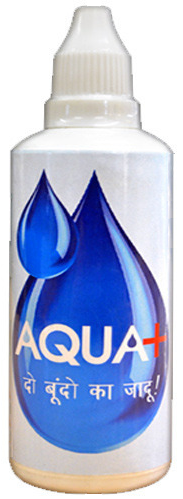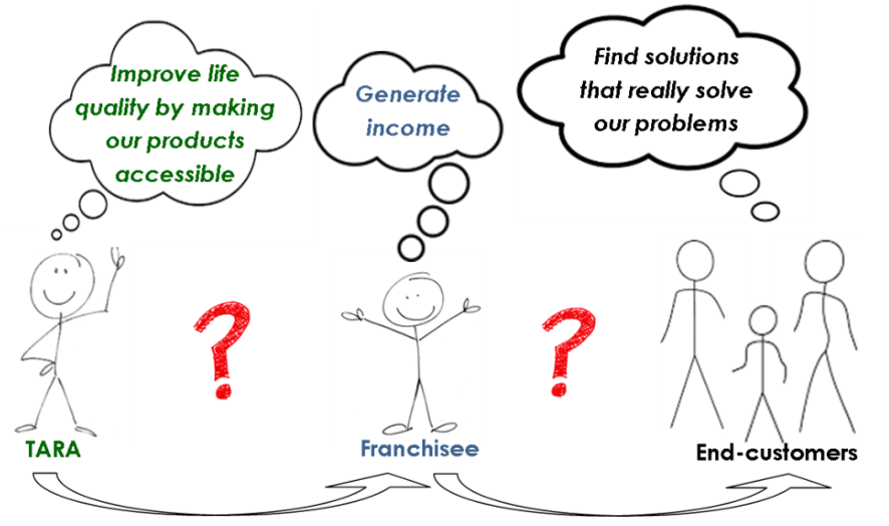This case study supports and illustrates the theoretic factsheet "Distribution process: retailers or mobile salesforce" with practical insights.

by Taralife.
Source:
TARA,
2016
Technology and Action for Rural Advancement (TARA) is a social enterprise, part of the Development Alternatives Group, set up in 1982 in New Delhi. TARA consists of multiple social sub-businesses that aim at fostering employment, entrepreneurship, sustainable technologies, as well as meeting basic needs as safe water in India. TARA began early on to realise the lack of access to clean drinking water is a major issue. The social business began to address this need by producing and selling Aqua+, a 50 ml bottle of Sodium Hypochlorite Solution (liquid chlorine). One bottle of Aqua+ has the ability to disinfect 500 litres of water, thus bringing down the cost of purification of 10 litres of water to 0.8 INR (0.01 USD).
After the commercial launch of the product in 2013, TARA has developed and tested several different distribution models and approaches to enhance last-mile delivery of Aqua+. Early partnerships showcased the strengths and limitations of working with government and non-government organizations to deliver Aqua+. In this old model TARA identified channel partners (mainly local NGOs and local retailers and shops) to deliver Aqua+. But sales remained low. A market analysis revealed that TARA placed too much responsibility on these channel partners who lacked the required knowledge to run successful marketing and sales campaigns. It revealed also that these partners had very little incentive to market, position and sell the flasks. As the outsourcing-model on one hand wasn’t able to ensure sufficient margins for the last mile sales agents leading to low motivation and dropouts as other products in their shops could be sold more easily, especially if higher in demand. Moreover, the company had little interaction with the customer, making it even more difficult to gain customer feedback.
In 2014 TARA setup a new for-profit company called TARAlife Sustainability Solutions Pvt. Ltd. to scale-up the sales of Aqua+ in India. To improve sales, TARAlife decided to team up with another department at TARA that had already been successfully building up their own sales processes and customer base. This allowed TARAlife to better monitor purchasing behaviour with less investment into building an entire distribution and customer base from scratch. To increase the margins across the supply chain and ensure effective and consistent social marketing, TARAlife is currently in the process of testing out a microfranchising model.
As the Acumen Fund puts it, microfranchising “leverages the basic concepts of traditional franchising, but is especially focused on creating opportunities for the world’s poorest people to own and manage their own businesses” (LEHR, 2011). Microfranchising is inherently decentralised so the reliability of the microfranchisors and microfranchisees is paramount. TARAlife provides the flasks of liquid chlorine along with all the appropriate marketing and training material to the franchisors. Each business region has a microfranchisor who distributes Aqua+, coordinates activities between the microfranchisees, oversees sales records and assists with the training and social marketing events. The sales are done by the microfranchisees (see picture above), most of whom already work in sales or own a small shop themselves and so are already familiar with this line of work. Nonetheless, not everyone is suited for it as Rajesh Kushwaha, a microfranchisor who oversees 20 micro franchisees in the Bhadohi district in the State of eastern Uttar Pradesh, candidly discussed, “at the beginning I had 30 micro franchisees, but the less motivated people who thought they could make a lot of money quickly left, leaving me with 20 people who are dedicated and believe in the product”. This is a learning process for TARA as well as the local community members to further understand the local market and scale up access to safe water for all. TARA is currently in the process of identifying more products to sell Aqua+ as part of a basic needs multi-product portfolio, leading to greater incomes for the micro franchisees and a bigger impact for the communities.

Monitoring customer satisfaction
Safe water products need to be sold in parallel to social marketing activities accordingly it is important to have a distribution system in place that allows thorough monitoring and motivated sales people. Customer feedback especially in the safe water market is key. Having the distribution outsourced makes it difficult to report customer satisfaction and track sales.
Margins are essential
One important factor of successful last-mile delivery is to have attractive margins in place for the whole distribution process. The challenge with safe water is that it is a low margin-high volume business, and to achieve high volumes depends on the market size and market penetration.
Motivation is key
TARA’s experience reveals that motivated and dedicated sales people are key to successfully distribute HWTS products to BoP customers.
Microfranchisor needs management skills
A microfranchisor who is overviewing microfranchisees needs motivation and management skills in order to smoothly brief and incentivise the sales people. Important for this task are also reliable marketing materials and process manuals from the headquarters (TARA) to facilitate training and sales.
Marketing is key
Make sure that social and commercial marketing activities are part of the distribution process to accordingly create a market and increase product visibility. It is important to create a sufficiently dynamic market so that a business can become profitable with low margins selling high volumes.
Know your potential distribution partner
There are advantages and disadvantages in outsourcing the distribution or to keep it internal to the business model. Before taking a decision which way to go, a thorough analysis of the environment and assessment of potential distribution partners should be performed (for further information see factsheet on smart partnering).
Overcoming the Last Mile Challenge: Distributing Value to Billions
Safe Water and Jobs - Creating Access to Safe Water in India through Women-Led Service Delivery Models
Microfranchising at the Base of the Pyramid
Micro franchising for the last mile delivery to the base of the pyramid in India: The case of TARAlife
Business Linkages: Supporting Entrepreneurship at the Base of the Pyramid
This paper presents the interesting results of the Roundtable Dialogue in Brazil in 2008 that brought together approximately 40 corporate business linkage practitioners and selected operational partners from civil society and the international development community to discuss supply, distribution, and sales models that foster entrepreneurship and enterprise development among those currently living in conditions of poverty.
JENKINS, B. ET AL. (2008): Business Linkages: Supporting Entrepreneurship at the Base of the Pyramid. Report of a Roundtable Dialogue June 10-12, 2008, Rio de Janeiro, Brazil. Washington DC: International Finance Corporation, International Business Leaders Forum, and the CSR Initiative at the Harvard Kennedy School URL [Accessed: 16.04.2018]The last 500 feet
This essay discusses the question of the so-called last mile delivery and offers different insights and approaches to meet the basic needs of people in rural and remote areas through viable market-based approaches.
POLAK, P. (2013): The last 500 feet. URL [Accessed: 16.04.2018]

